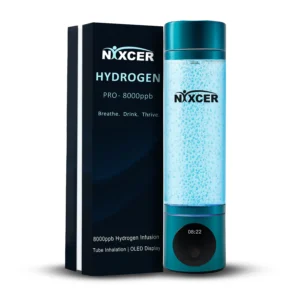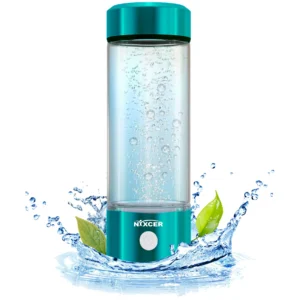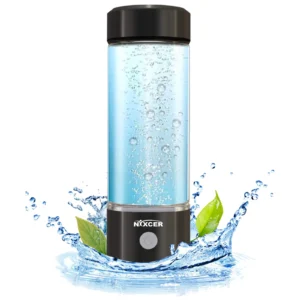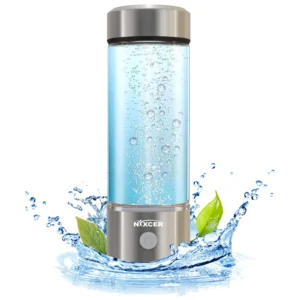Free Shipping All Over US
Huge Discount + Free U.S Shipping

Hydrogen water has gained popularity for its potential health benefits, including improved hydration, reduced inflammation, and antioxidant properties. If you have a Nixcer hydrogen water bottle, you may be asking: can you use tap water in it?
The answer is yes, but there are important considerations to ensure optimal performance and longevity of your device. In this guide, we will look at if tap water is good for your hydrogen water bottle. We will also discuss the best types of water to use. Lastly, we will share tips for keeping your Nixcer hydrogen water bottle in great shape for the best results.
Hydrogen water is regular water infused with molecular hydrogen (H₂), a potent antioxidant believed to neutralize harmful free radicals without disrupting essential cellular functions. Research suggests potential health benefits, including:
While these benefits are promising, research is still ongoing, and individual results may vary. The quality of water in your hydrogen water bottle is crucial. It helps you get the most benefits and keeps your device working longer.
Hydrogen water bottles, like those from Nixcer, use electrolysis to infuse water with molecular hydrogen. The process involves:
The efficiency of hydrogen generation depends on water quality. Impurities like minerals and chlorine can interfere with electrolysis, reduce hydrogen concentration, and cause buildup in the bottle.
Yes, you can use tap water in a hydrogen water bottle, but it’s not always the ideal choice. Tap water quality varies by location and may contain:
Using tap water can lead to:
To use tap water effectively, consider filtering it first to remove chlorine and reduce mineral content. Regular cleaning is also essential to maintain your bottle’s performance.
For optimal hydrogen generation and device longevity, consider these water types:
| Water Type | Pros | Cons | Recommendation |
| Distilled Water | Free from minerals and impurities, ensures efficient hydrogen generation. | May lack natural taste. | Ideal for maximum hydrogen concentration. |
| Reverse Osmosis (RO) | Highly purified, prevents buildup, supports optimal hydrogen infusion. | May require remineralization for taste. | Excellent choice for hydrogen bottles. |
| Filtered Water | Removes chlorine and some minerals, practical for everyday use. | Effectiveness depends on filter quality. | Good alternative if distilled/RO unavailable. |
| Spring Water | Naturally pure, low mineral content suitable for hydrogen generation. | Mineral content varies; check before use. | Recommended if low in minerals. |
| Mineral Water | Contains beneficial electrolytes but may cause buildup. | High mineral content can reduce efficiency. | Use with caution; prefer low-mineral brands. |
| Alkaline Water | Popular for health claims but high pH may interfere with electrolysis. | Less effective for hydrogen infusion. | Not recommended. |
| Carbonated Water | Fizzy and enjoyable but can damage bottle components. | Interferes with hydrogen generation. | Not recommended. |
Distilled and RO water are free from impurities, ensuring efficient electrolysis and high hydrogen concentration. They also minimize maintenance needs by preventing mineral buildup.
If distilled or RO water isn’t available, filtered tap water is a practical alternative. Good filters, like activated carbon or reverse osmosis systems, can remove chlorine and lower minerals. This makes tap water better for your hydrogen water bottle.
If you choose to use tap water in your Nixcer hydrogen water bottle, follow these tips:
Proper maintenance ensures your Nixcer hydrogen water bottle performs optimally and lasts longer. Follow these guidelines:
Water quality directly impacts the efficiency of hydrogen generation and the quality of hydrogen-rich water. Pure water allows for better hydrogen infusion, ensuring you get the maximum health benefits. Additionally, using high-quality water reduces wear on your hydrogen water bottle, minimizing maintenance and extending its lifespan.
Nixcer designs hydrogen water bottles with advanced technology and user-friendly features to deliver high-quality hydrogen water. Key benefits include:
By choosing Nixcer, you are investing in a trustworthy product. It helps you enjoy the health benefits of hydrogen water.
To start enjoying hydrogen water with your Nixcer bottle:
In summary, you can use tap water in a hydrogen water bottle. However, distilled, reverse osmosis, or filtered water is better. This choice helps with hydrogen generation and makes the device last longer.
Tap water’s impurities, like chlorine and minerals, can reduce efficiency and require more frequent maintenance. To get the best health benefits from your Nixcer hydrogen water bottle, choose good quality water. Also, be careful when you handle the bottle.
Yes, hydrogen water is generally safe, as molecular hydrogen is non-toxic. Consult a healthcare professional if you have specific concerns.
Hydrogen concentration decreases over time because of off-gassing. Drink within 30 minutes to an hour for maximum benefits.
Yes, but room-temperature water is better for optimal hydrogen generation.
Absolutely, especially with tap water. Routine descaling stops mineral accumulation and preserves efficiency.
Yes, hydrogen water contains molecular hydrogen for antioxidant benefits, while alkaline water has a higher pH. They serve different purposes.
Hydrogen water can be part of your hydration routine, but it’s not necessary to replace all regular water. Staying hydrated with any safe water is key.




Share Article:

The Ultimate Hydrogen Water Bottle for Health & Wellness
Copyright © 2025 Nixcer
Notifications